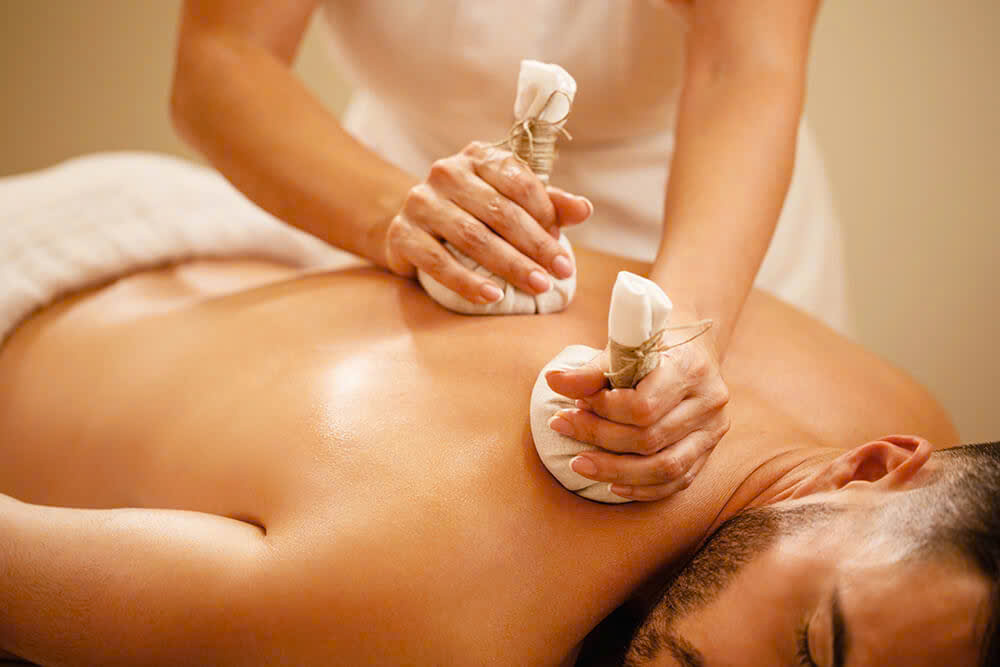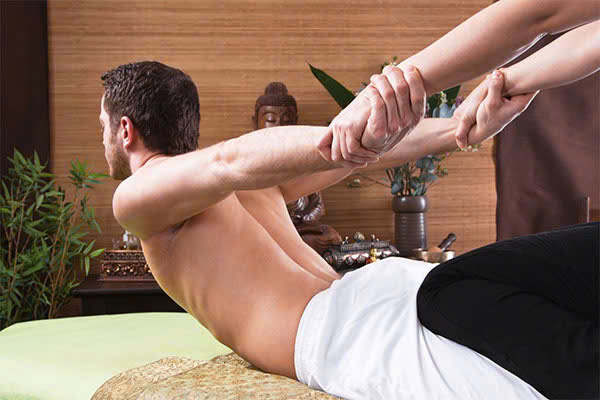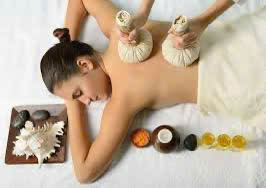Discover Thai Massage & Thai Herbal Compress Massage: Benefits & Differences
In today’s wellness landscape, *thai massage and thai herbal compress massage have gained immense popularity for their holistic approach to health and relaxation. Both therapies stem from Thailand’s rich cultural heritage and traditional healing practices. While they share similarities, understanding the nuances between thai massage and thai herbal compress massage, including their unique benefits and methods, can help you choose the most suitable treatment for your needs.*

Thai Massage and Thai Herbal Compress Massage
Before diving into the specifics, it’s crucial to understand what thai massage and thai herbal compress massage truly entail. These therapies are deeply rooted in Thai tradition, yet they differ significantly in technique, purpose, and application. Recognizing these differences is essential for anyone interested in incorporating them into their health regimen.
Thai massage, often called “lazy man’s yoga,” combines stretching, acupressure, and assisted yoga postures, aiming to enhance flexibility, relieve tension, and promote overall well-being. Conversely, thai herbal compress massage involves the application of heated herbal packs that release medicinal properties, targeting muscle pain, inflammation, and skin health.
Despite their differences, both practices emphasize energy flow, holistic healing, and the use of natural ingredients. They can be used separately or combined for a comprehensive approach to physical and mental health.
Origins and Cultural Significance
Thai massage has origins dating back over 2,500 years, influenced by Indian Ayurvedic medicine, Chinese traditional medicine, and indigenous Thai healing methods. It was historically performed in temples and royal palaces, serving both spiritual and medicinal purposes. Today, it remains an integral part of Thai culture, recognized by UNESCO as an intangible cultural heritage.
The thai herbal compress massage originated from the Ayurvedic tradition, utilizing herbs known for their therapeutic qualities. This method is often linked with traditional healing rituals and festivals across Thailand. The herbal packs are meticulously prepared using local botanicals such as turmeric, lemongrass, ginger, and kaffir lime leaves, which are believed to possess anti-inflammatory, detoxifying, and calming effects.
Technique and Application
Thai massage typically involves massaging the body with the practitioner’s hands, elbows, knees, and feet while guiding the recipient through passive stretches and yoga-like positions. It is performed on a mat on the floor, allowing for full-body engagement and flexibility in techniques. The focus is on relieving muscular tension, stimulating blood circulation, and balancing energy pathways (called ‘Sen’ lines).
Thai herbal compress massage employs a small cloth bundle filled with mixed herbs, steamed until warm, then pressed onto specific areas of the body. The heat and herbal aroma penetrate deep into tissues, promoting relaxation and healing. Practitioners can also use gentle kneading and circular movements to enhance absorption and effectiveness. The herbal compress can be applied repeatedly, targeting specific pain points or body regions.
Suitability and Precautions
Both therapies are suitable for a wide range of individuals, but certain conditions warrant caution. Pregnant women, for instance, should consult with healthcare providers before receiving either treatment. People with skin allergies to herbs or severe medical issues should seek advice beforehand.
In summary, thai massage is more active and movement-based, ideal for those seeking flexibility and stress relief, while thai herbal compress massage offers a soothing, herbal-infused experience that targets localized pain and inflammation. Understanding these basic distinctions sets the foundation for exploring their respective benefits and choosing the best therapy for your wellness goals.

What is Thai Massage and Thai Herbal Compress Massage
Understanding what is thai massage and thai herbal compress massage helps clarify their roles in traditional Thai medicine and modern wellness routines. These treatments have evolved over centuries, integrating ancient philosophies with contemporary health practices.
What is Thai Massage?
Thai massage is a dynamic form of manual therapy combining elements of acupressure, stretching, and gentle yoga. Unlike Western massage, which predominantly relies on oil-based strokes, this therapy emphasizes energy lines and meridians, aiming to unblock energy flow and restore harmony within the body.
Practitioners use palms, thumbs, elbows, knees, and feet to apply pressure along the body’s Sen lines, believed to influence physical and energetic health. The massage often involves assisted stretching sequences, which improve joint mobility and muscle elasticity. Sessions typically last from one to two hours, offering a comprehensive experience that addresses both physical discomfort and mental relaxation.
What is Thai Herbal Compress Massage?
Thai herbal compress massage involves steaming bundles of herbs wrapped in cotton cloth—known as herbal balls—that are pressed, rolled, and sometimes gently hammered onto the body. The herbal packs are infused with a mixture of botanicals such as turmeric, lemongrass, ginger, and kaffir lime, which release aromatic oils and medicinal compounds upon steaming.
The technique combines the benefits of heat therapy, herbal medicine, and massage. The warmth enhances blood circulation, relaxes muscles, and facilitates detoxification. The herbal scent promotes calming effects on the nervous system, making it an excellent choice for stress reduction, muscle soreness, and skin ailments.
The Practice Environment and Equipment
Thai massage requires a practitioner trained in traditional techniques and is usually performed on a padded mat on the floor, allowing for full-body movements and stretch adjustments. The environment is typically tranquil, with soft lighting and calming music to enhance relaxation.
Thai herbal compress massage may be performed in a similar setting but emphasizes the use of steam-heated herbal bundles. The practitioner manipulates these herbal packs directly on the skin, often starting with larger muscle groups like shoulders and back before moving to smaller areas.
The Role of Therapist Expertise
While both treatments require skilled practitioners, thai massage demands extensive knowledge of anatomy, pressure points, and safe stretching techniques. Proper training ensures effective and safe treatment, especially when applying deep pressure or assisting with stretches.
For thai herbal compress massage, therapists must be proficient in preparing herbal packs and steaming techniques, ensuring that herbs are appropriately mixed and that the temperature remains safe for the client. Their skill in pressing and rolling the herbal packs determines the overall efficacy and comfort.
Differentiating Between the Two in Practice
It is vital to recognize that what is thai massage aims at rebalancing energy and improving flexibility through movement and pressure, making it suitable for those who enjoy active therapy.
On the other hand, what is thai herbal compress massage offers a more passive approach, focusing on heat, herbal infusion, and targeted pressure, ideal for relaxation, detoxification, and pain relief.
Both therapies complement each other well and can be combined for enhanced results, providing a holistic approach to health and well-being.

What is the Difference Between Thai Massage and Thai Herbal Compress Massage
Although thai massage and thai herbal compress massage originate from the same cultural roots, their methods, applications, and benefits diverge significantly. Comprehending these differences allows individuals to select the therapy best suited to their needs.
Methodology and Techniques
Thai massage is characterized by its active approach involving physical manipulation, stretching, and acupressure. It requires the therapist to perform precise movements, guided by the client’s responses and comfort levels. The focus is on mobilizing joints, stretching muscles, and restoring energy flow through rhythmic pressure points.
In contrast, thai herbal compress massage involves passive application of heat and herbal packs. The therapist presses and rolls the herbal bundles onto the body, sometimes combined with light massage strokes. This method is less physically demanding for the therapist and emphasizes soothing, warming, and herbal infusion effects.
Timing and Duration
Thai massage sessions generally last longer, often up to two hours, due to the variety of techniques involved. Its active nature makes it suitable for those seeking a workout for muscles and joints, as well as mental relaxation.
Thai herbal compress massage tends to be shorter, usually between 60 to 90 minutes, focusing on targeted areas affected by pain or stress. Its brevity does not diminish its effectiveness but makes it more accessible for quick recovery or relaxation sessions.
Targeted Benefits and Outcomes
Thai massage excels in improving joint mobility, increasing flexibility, releasing muscular tension, and balancing the body’s energy pathways. It is particularly helpful for individuals with chronic muscle stiffness, headaches caused by stress, or those recovering from physical strain.
Thai herbal compress massage is renowned for its ability to alleviate localized pain, reduce inflammation, and detoxify the body. The herbal heat penetrates deeply, making it ideal for conditions like muscle soreness, arthritis, and skin issues. Additionally, the aromatic herbs provide aromatherapy benefits, enhancing mental clarity and emotional balance.
Sensory Experience Thai massage and Thai herbal compress massage
Thai massage provides a dynamic, interactive experience where clients actively participate as the therapist guides stretches and applies pressure. The tactile experience is firm yet relaxing, often leaving clients feeling invigorated or deeply relaxed depending on intensity.
Thai herbal compress massage offers a more passive, sensory-rich encounter. The warmth, herbal aroma, and gentle pressing create a soothing cocoon around the client, often inducing a meditative state and profound relaxation.
Cost and Accessibility Thai massage and Thai herbal compress massage
Typically, thai massage services are widespread and vary in price depending on location, duration, and practitioner expertise. Because it involves more extensive physical work, it may be slightly more costly.
Thai herbal compress massage might be priced similarly but can sometimes be more expensive due to the preparation of herbal packs and steaming process. However, it remains accessible and popular in wellness centers worldwide.
| Aspect | Thai Massage | Thai Herbal Compress Massage |
|---|---|---|
| Technique | Active, stretching, acupressure | Passive, heat, herbal compression |
| Duration | Usually 1-2 hours | Typically 1 hour or less |
| Focus | Flexibility, energy balance | Pain relief, detoxification |
| Sensory Experience | Dynamic, interactive | Passive, aromatic, soothing |
| Best For | Improving mobility, stress release | Localized pain, inflammation, relaxation |
Understanding what is difference between these therapies empowers clients to make informed decisions based on their health conditions, preferences, and wellness objectives.
The Benefits of Thai Massage and Thai Herbal Compress Massage
Both thai massage and thai herbal compress massage offer a plethora of health benefits, ranging from physical relief to mental calmness. Recognizing these advantages helps individuals appreciate why these therapies have become staples in holistic health practices.
Physical Benefits Thai massage and Thai herbal compress massage
Enhanced Circulation and Lymphatic Drainage
Both therapies stimulate blood flow, which aids in oxygen delivery to tissues and promotes the removal of metabolic waste. Improved circulation supports healing processes, reduces swelling, and keeps skin healthy. The rhythmic pressure and warmth facilitate lymphatic drainage, reducing fluid retention and toxins.
Muscle Relaxation and Flexibility
Thai massage’s stretching and manual pressure effectively loosen tight muscles, alleviating stiffness, spasms, and knots. It is particularly beneficial for athletes, office workers, or anyone experiencing muscle tension. The thai herbal compress massage deepens relaxation by penetrating heat and herbal-infused oils into muscles, easing soreness and stiffness.
Pain Management
Both therapies are widely used for managing chronic pain conditions like arthritis, lower back pain, and migraines. The acupressure points and herbal heat help reduce inflammation and modulate nerve signals, leading to decreased discomfort.

Mental and Emotional Benefits Thai massage and Thai herbal compress massage
Stress Reduction
The tranquil environment, gentle touch, and aromatic herbs of thai herbal compress massage induce a state of deep relaxation, reducing cortisol levels and calming the nervous system. Similarly, thai massage’s mindful movements and rhythmic pressure alleviate mental tension, depression, and anxiety.
Improved Sleep and Mental Clarity
Regular sessions can improve sleep quality by calming the mind and relaxing the body. The release of endorphins during these treatments fosters feelings of well-being, mental clarity, and emotional balance.
Detoxification and Skin Health
Herbal Infusion and Heat Therapy
The heating process in thai herbal compress massage encourages sweating, which helps expel toxins through the skin. The herbs contain antioxidants and antimicrobial compounds that nourish the skin, improve complexion, and treat skin conditions like eczema and psoriasis.
Holistic Wellness and Lifestyle Benefits
Energy Balance and Chakra Alignment Thai massage and Thai herbal compress massage
Both treatments aim to restore the balance of vital energy or ‘Prana.’ While thai massage directly influences energy flow through physical manipulation, thai herbal compress massage enhances energetic harmony via aromatic herbs and warmth.
Enhancement of Immune Function Thai massage and Thai herbal compress massage
Regular massage therapy has been shown to bolster immune response by reducing stress hormones, improving circulation, and stimulating lymphatic activity.
Specific Benefits Summary Table
| Benefit Category | Thai Massage | Thai Herbal Compress Massage | Key Outcomes |
|---|---|---|---|
| Circulatory health | Yes | Yes | Better blood flow, toxin removal |
| Muscle health | Yes | Yes | Increased flexibility, reduced soreness |
| Pain relief | Yes | Yes | Chronic and acute pain management |
| Stress reduction | Moderate | High | Deep relaxation, mental clarity |
| Skin health | Indirect | Direct | Improved skin tone, detoxification |
| Energy balance | Yes | Yes | Restores vitality and harmony |
Recognizing these benefits allows health-conscious individuals to tailor their therapy choices according to their priorities, whether it’s physical rehab, mental tranquility, or skin rejuvenation.
What You Need to Know About Thai Massage and Thai Herbal Compress Massage
Before scheduling treatments or integrating these therapies into your routine, there are vital considerations to ensure safety, effectiveness, and personal satisfaction.
Preparation and Expectations Thai massage and Thai herbal compress massage
Understanding the process of each therapy sets realistic expectations. Clients should arrive well-hydrated, wear comfortable clothing, and communicate any health concerns or preferences to the therapist.
For thai massage, expect a series of stretches, pressure, and movement. It is common to experience some soreness initially, especially if muscles are tight. Communicate with your therapist about pressure levels and areas to avoid.
Thai herbal compress massage involves lying still as herbal packs are pressed onto your body. The sensation is often warm, fragrant, and deeply soothing. If you have sensitive skin or allergies, inform the therapist to adjust herbal blends accordingly.
Contraindications and Precautions Thai massage and Thai herbal compress massage
Certain health conditions require caution or avoidance:
- Pregnancy (consult with healthcare provider)
- Skin infections or open wounds
- Fever or contagious illnesses
- Severe cardiovascular issues
- Allergies to herbs used in compresses
- Recent surgeries or fractures
Always disclose your medical history and current medications before treatment. Therapists trained in traditional Thai practices are aware of contraindications and will advise accordingly.
Choosing the Right Therapist and Setting Thai massage and Thai herbal compress massage
Ensure that you visit reputable wellness centers with certified practitioners experienced in Thai massage techniques. Proper training and adherence to hygiene standards, especially when dealing with herbal compresses, are critical for safety and efficacy.
A serene, clean environment enhances the therapeutic experience. Discuss your goals with the therapist to customize the session, focusing on areas needing attention or relaxation.
Post-Treatment Care Thai massage and Thai herbal compress massage
Post-session hydration is essential to aid detoxification and prevent soreness. Light stretching, adequate rest, and continued hydration optimize the benefits.
For thai herbal compress massage, avoid strenuous activities immediately afterward and note any allergic reactions or unusual sensations and report them promptly.
Cost and Frequency
The frequency of treatments varies based on individual needs—weekly, bi-weekly, or monthly sessions are common. Costs depend on location, session length, and practitioner expertise. Investing consistently yields better long-term health outcomes.
Integrating into a Wellness Routine Thai massage and Thai herbal compress massage
Both thai massage and thai herbal compress massage can complement other health practices such as yoga, meditation, and dietary adjustments. Combining therapies and lifestyle modifications amplifies benefits, fostering holistic health.
Which One Is the Best for You? Thai massage and Thai herbal compress massage
Choosing between thai massage and thai herbal compress massage hinges on your personal health goals, preferences, and physical condition. Here’s a detailed perspective to help guide your decision.
Consider Your Health Goals Thai massage and Thai herbal compress massage
If your primary aim is to increase flexibility, improve joint mobility, and relieve muscular tension, thai massage may be more suitable. Its active stretching and acupressure techniques target musculoskeletal issues effectively.
Conversely, if you seek deep relaxation, localized pain relief, detoxification, or skin rejuvenation, thai herbal compress massage offers a gentle, aromatic experience that penetrates tissues with warmth and medicinal herbs.
Personal Preference and Comfort Thai massage and Thai herbal compress massage
Some individuals prefer the physical engagement of thai massage, enjoying the movement and active role in therapy. Others find the calming warmth and herbal aroma of thai herbal compress massage more appealing, especially if they dislike vigorous manipulation.
Consider any sensitivities or allergies—herbal ingredients can vary, so inquire about herbal compositions beforehand.
Medical Conditions and Contraindications Thai massage and Thai herbal compress massage
Chronic conditions like arthritis, muscular injuries, or stress-related ailments may respond differently. Consulting with a healthcare provider or a qualified Thai therapist can provide personalized recommendations.
Pregnant women, for example, should avoid certain massage techniques or herbal packs, emphasizing the importance of professional guidance.
Cost, Time, and Accessibility Thai massage and Thai herbal compress massage
Evaluate practical factors such as budget, time availability, and access to qualified practitioners. Some clinics specialize in one modality over the other, so research and reviews can inform your choice.
Combining Therapies for Optimal Results Thai massage and Thai herbal compress massage
Many individuals benefit from a combination approach—alternating between thai massage and thai herbal compress massage—to harness the strengths of both. This integrated strategy can address various health aspects thoroughly.
Final Decision
Ultimately, the best therapy aligns with your personal health objectives, comfort level, and lifestyle. Both therapies are powerful tools in promoting holistic wellness, and exploring either can lead you toward improved health, relaxation, and vitality.https://www.tiktok.com/@jobe.spa.massage?_r=1&_d=secCgYIASAHKAESPgo8SuqYy7NRO1FeoQTh9B5FczltSO7%2Bnze4Q0cQhGIWGrFLod41uBvRiZEzV4eE2%2B8ADffPkXwoMJH8LmA9GgA%3D&_svg=1&checksum=7011281f863d74eafc4fef0a46feb398b3a617bdc01855afc054ff272433ee8b&sec_uid=MS4wLjABAAAAfjsGHILZR057yNwqzc__4qTCea5t4hDtpy3wIQkSo7a-zhAFWrmak_jNLWyDZ9Lx&sec_user_id=MS4wLjABAAAAfjsGHILZR057yNwqzc__4qTCea5t4hDtpy3wIQkSo7a-zhAFWrmak_jNLWyDZ9Lx&share_app_id=1233&share_author_id=7199609050761397254&share_link_id=0dd2e0cb-c41c-445e-ad12-93213f6ddfbf&sharer_language=vi&social_share_type=5&source=h5_m×tamp=1742698898&u_code=e6c472eacb6d23&ug_btm=b8727%2Cb7360&ugbiz_name=ACCOUNT&user_id=7199609050761397254&utm_campaign=client_share&utm_medium=android&utm_source=whatsapp_business
Conclusion
Discovering the benefits and differences between Thai massage and Thai herbal compress massage equips you with the knowledge to make informed choices about your wellness journey. While thai massage excels in enhancing flexibility, relieving muscular tension, and balancing energy flow through active manipulation, thai herbal compress massage offers a soothing, herbal-infused experience that promotes detoxification, localized pain relief, and deep relaxation. Each therapy carries its unique advantages, rooted in centuries-old tradition, adapted for modern health needs. Whether you seek invigorating movement or gentle warmth, understanding what is thai massage and what is thai herbal compress massage, along with their respective benefits, will guide you to the right treatment for your body and mind. Incorporating these therapies into your routine can foster holistic well-being, resilience, and serenity—making them invaluable assets on your path to optimal health.
Embark on your wellness adventure with confidence, knowing that the rich heritage of Thai healing offers diverse paths tailored to your needs. Whichever you choose, both *thai massage and thai herbal compress massage hold the promise of rejuvenation, balance, and holistic health.*https://jobedubaispa.com/head-massage/
